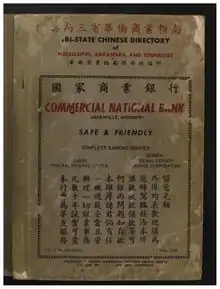Chinese Americans in the Mississippi Delta
The Mississippi Delta Chinese are a small community of Chinese Americans that has lived in the Mississippi Delta region since the late 19th century. A related population of Chinese Americans lives across the Mississippi River in the Arkansas Delta and the nearby city of Memphis, Tennessee.[1]

History
The earliest Chinese settlers in the Mississippi Delta were laborers recruited by cotton planters to supplement the recently emancipated African freedmen during Reconstruction. Like other early Chinese Americans, the first Chinese immigrants were peasants and merchants from the Sze Yap region of Guangdong province in Southern China. All of them were single and married men who worked in Mississippi and sent most of their income back to their families in China. As they were neither black nor white, the Chinese were often classified as "colored" in early government records.[2][3]
By the end of the 1870s, the Chinese had abandoned the plantations and began opening small family-owned grocery stores in the many small towns of the Delta. Chinese families began moving to the Delta in the early 1900s, and most modern Mississippi Delta Chinese are the descendants of Chinese who arrived in Mississippi during this time. Until the end of the 1900s, Chinese-owned groceries could be found in every Delta city and town, serving both white and black customers. Chinese children were originally segregated from the white public schools, and segregated Chinese schools were built for them in Greenville and Cleveland. However, these schools were closed and Chinese children were allowed to attend both white schools and white colleges after the Second World War.[4][5][6][7]
The population of the Mississippi Delta Chinese exploded after war. Many young Chinese men from the Mississippi Delta served as soldiers during the Second World War, and many women from China married these soldiers and settled in the Delta as war brides after the war. By the 1970s there were as many as 3,000 Americans of Chinese descent living in the Delta, especially American-born Chinese children who were raised in the Delta. For decades the Mississippi Delta Chinese community was one of the largest Chinese American communities in the American South, but since then, many families have moved to larger cities in Texas, the West Coast, and the Northeast. Most of the historic Chinese groceries have already closed, and only a few families remain in the Delta.[8][9][10]
Ethnic identity
Arriving into a strictly segregated society with whites on top and blacks on the bottom, the Chinese carved out their own unique niche in a primarily biracial society. Neither black nor white, they were initially classified as "non-white" and later as simply "Chinese". While not seen as being on the same social status as whites neither were they seen on the same level as blacks despite often living in black neighborhoods and serving mostly black clients and customers. The Chinese were middlemen between blacks and whites, often providing a needed contact point in a segregated society. The Chinese initially attended separate Chinese schools separate from both blacks and whites although in later decades before segregation officially was outlawed, they often attended schools with white students. In many cases they sought to identify with white society as much as they could due to whites having the highest status in Jim Crow society.[11] Many Chinese men, for the lack of Chinese women to marry, married Black women.
Notable people
- Sam Chu Lin, journalist and news anchor
- Martin F. Jue, entrepreneur and inventor
- Josephine Jue, NASA computer scientist
- Only Won, producer of Far East Deep South
References
- "Chinese," Enclyopedia of Arkansas, 2017
- Loewen, James W. 1971. The Mississippi Chinese: Between Black and White, Cambridge: Harvard University Press
- Quan, Robert Seto. 1982. Lotus Among the Magnolias: The Mississippi Chinese, Jackson: University Press of Mississippi
- Gong, Gwendolyn. The Mississippi Chinese of World War II: A Delta Tribute. Cleveland, Mississippi: Delta State University, 2015.
- 美南三省華僑商業指南 Tri-State Chinese Directory. 1952. https://archive.org/details/Tri-stateChineseDirectoryOfMississippiArkansasAndTennessee
- Shepherd, Ted. The Chinese of Greenville Mississippi: Success and Opportunity. Greenville, Mississippi: Burford Brothers Printing Company, 1999.
- Jung, John. 2011. Chopsticks in the Land of Cotton: Lives of Mississippi Delta Chinese Grocers., Yin & Yang Press.
- Block, Melissa (2017-03-18). "The Legacy Of The Mississippi Delta Chinese". NPR.
- Thornell, John G. (2008). "A Culture in Decline: The Mississippi Delta Chinese". Southeast Review of Asian Studies. 30: 196–202. Seen on Gale Group.
- Estrin, James (13 March 2018). "Neither Black Nor White in the Mississippi Delta". The New York Times. Retrieved 26 April 2018.
- Wilson, Charles Reagan. "Chinese in Mississippi: An Ethnic People in a Biracial Society". Mississippi History Now. Mississippi Historical Society. Retrieved 26 April 2018.
Further reading
- Oral Histories, Chinese Grocers. Southern Foodways Alliance (2010). Chinese Grocers | Southern Foodways Alliance
- Chinese Oral Histories. Delta State University. Chinese Oral Histories
- Winter, R. Milton (Summer 2000). "Rosedale Presbyterians and the Mississippi Chinese: Changing Concepts of Equality in an Aristocratic Southern Town". The Journal of Presbyterian History. Presbyterian Historical Society. 78 (2): 169–173. JSTOR 23335428.
- Shin (신), Ji Hye (지혜) (2014-11-30). "In Between: The Mississippi Chinese and the American Racial Structure" (PDF). 미국학 / American Studies. 37 (2): 81. doi:10.18078/amstin.2014.37.2.003. ISSN 1229-4381. – From the Korea Information Science Society (KISS) – Profile
- Kim, Heidi (April 2016). "4 The Foreign Faulkner: The Mississippi Chinese in Faulkner's South". Invisible Subjects: Asian America in Postwar Literature Invisible Subjects: Asian America in Postwar Literature. pp. 130–170. doi:10.1093/acprof:oso/9780190456252.003.0005. – Read online
- Media
External links
- The Delta Chinese – Project by Andrew Kung and Emmanuel Hahn